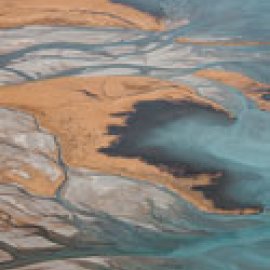Nature's Balance Sheet
-
English
-
ListenPause
[intro music]
Welcome to World Ocean Radio…
I’m Peter Neill, Director of the World Ocean Observatory.
In business, as in life, there is a balance sheet, a statement of assets, showing the difference between income and expense, profit and loss, and capturing a moment wherein our accounts are in balance, or not.
The balance sheet is an indication of standing in the world, for a government and its management of debt, for a company asserting its value, or for an individual with a checkbook and a credit card, a mortgage and other financial obligations. The question contained therein is: Am I solvent? Can I meet my obligations? For some, there is more than enough, sometimes beyond even the need for accounting. They are profligate, enabled, ironically unaccountable for expenditure and its consequence. They consume without reflection. Others are not so fortunate, not always a result of personal failure or sloth, often the result of circumstances over which they have had, and have still, no control whatsoever. For the secure and safe, life is balanced and enduring; for others, life is desperate, irrational, threatened, hopeless. The inequality and inequity of the contrast indicates assets out of balance, stability threatened, often bankruptcy, financial and otherwise, inevitable.
In a world where consumption is the operative value, the health of an entity is measured by its asset base, not in gold or bitcoin, but at its source, the elements of production and wealth creation, enabled by natural resources: coal, oil, gas, sacrificial minerals, water, and food for harvest – the wealth of Nature. By definition today, we are living beyond our means, over-consuming what is available, consuming without limit, over-shooting the capacity of the earth and ocean to provide even our basic needs. Beyond any individual or national debt, there is an underlying critical withdrawal without compensating deposit that is taking us to the brink of survival.
Some don’t care. Some are already there. Some don’t understand; some do, and feel helpless, with consequent anxiety and despair. Think about it this way: one day your home is destroyed by weather or war, seemingly without reason; one day your bank account is empty without recourse; one day the national government upon which you depend for so many public services is overwhelmed by unreconcilable debt and can no longer provide for your education, health, welfare, and safety. What if you know this is happening and take no action to adapt, mitigate, or invent an alternative?
Stand back and take stock of undeniable signs. We are exhausting clean air. We are running out of fresh water. World trade is interrupted by canals run dry, straits for safe passage no longer immune from terrorist attack, drought reducing fields to dust, forests to wildfire, lakes to streams, streams to dry runs, changed weather patterns so disruptive that safe places in country and town are no longer habitable. Some would argue that we are already a failed state and only autocracy will save us. That is surrender, and only more hurt, less freedom, will follow.
When we are wounded, we turn to Nature for cure – old wives’ tales, herb poultices, proven remedies, antibiotics derived, new medicines synthesized from natural things – and we heal. Why would we not apply that wisdom again now? Why would we not conserve and renew the very things we need? Why would we succumb to failure and despair when we have the alternative pathway to success and stability before us? Why would we choose debt and imbalance when there is still a natural balance available, to deposit against decline and loss?
What do these ruminations have to do with the ocean you might ask.
The ocean gives me hope these days five ways: first, it is vast and enduring and implies continuity in time and place; second, it contains all the elements we need to renew: energy, fresh water, food, and exchange; third, it connects us, not just through trade, but through ideas and socio-political action; fourth, it is humbling in its aspect, putting our fears and aspirations into perspective beyond ourselves; and fifth, it is a suffusion of light in a world seemingly dark, it is beautiful, challenging, communal, and connecting, providing inspiration, imagination, and optimism for the future. The ocean is the balance for our times, and when we truly understand its power, honor its capacity, and welcome its inherent profit, we will find safe passage home.
We will discuss these issues, and more, in future editions of World Ocean Radio.
[outro music]
In business, as in life, there is a balance sheet, a statement of assets, profit and loss, income and expense, showing whether our accounts are in balance, or not. In a consumption and production driven society, we must understand the asset value, balance and imbalance of our planet's natural resources: coal, oil, gas, minerals, water, and food: the wealth of our world.
About World Ocean Radio
World Ocean Radio is a weekly series of five-minute audio essays available for syndicated use at no cost by college and community radio stations worldwide. Peter Neill, Director of the World Ocean Observatory and host of World Ocean Radio, provides coverage of a broad spectrum of ocean issues from science and education to advocacy and exemplary projects.
World Ocean Radio
14 Years, 700+ Episodes
Ocean is climate
Climate is ocean
The sea connects all things
- Login to post comments



